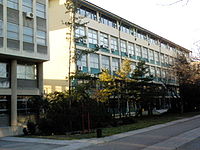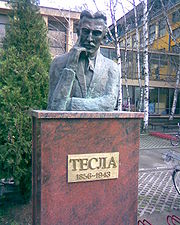
Faculty of Technical Sciences (Novi Sad)
Encyclopedia

Novi Sad
Novi Sad is the capital of the northern Serbian province of Vojvodina, and the administrative centre of the South Bačka District. The city is located in the southern part of Pannonian Plain on the Danube river....
, the capital of the Serbia
Serbia
Serbia , officially the Republic of Serbia , is a landlocked country located at the crossroads of Central and Southeast Europe, covering the southern part of the Carpathian basin and the central part of the Balkans...
n province Vojvodina
Vojvodina
Vojvodina, officially called Autonomous Province of Vojvodina is an autonomous province of Serbia. Its capital and largest city is Novi Sad...
and is part of University of Novi Sad
University of Novi Sad
The University of Novi Sad is a university located in Novi Sad, the capital of Serbian province of Vojvodina and the second largest city in Serbia....
. It was founded in 1960 and today, with 700 employees and 9,000 students, it is one of the largest faculties in the region. The word Faculty in Europe stands for an academic institution, the sub-unit inside the University.
History

University of Belgrade
The University of Belgrade is the oldest and largest university of Serbia.Founded in 1808 as the Belgrade Higher School in revolutionary Serbia, by 1838 it merged with the Kragujevac-based departments into a single university...
. With Novi Sad's charter as a University on June 28, 1960, the faculty became an integral part of it.
Faculty of Technical Sciences began its work with seven teachers and ten assistants in the modified Technical School. The first dean of the newly-opened faculty was Evgenije Čupić, and the first Chief of FTN council was Marko Bačlija.
All the studies were in two levels and lasted four years. Lectures followed the educational plan of the University of Belgrade
University of Belgrade
The University of Belgrade is the oldest and largest university of Serbia.Founded in 1808 as the Belgrade Higher School in revolutionary Serbia, by 1838 it merged with the Kragujevac-based departments into a single university...
Faculty of Mechanical Engineering.
In 1962 the faculty acquired the Pedagogical Center building, where higher courses of studies were held. For a time, the Pedagogical Center belonged to the Faculty of Law; later it was returned to the Faculty of Technical Sciences. Today it is known as the "F" Block. An additional 890 m2 of laboratory and cabinet space was built for the Department for Power, Electronics and Communication Engineering.
The year following the Institute of Mechanical Engineering's completion in 1965, the faculty adopted a new plan of studies, raising the course length to five years.
The building of the teaching block and Rectorate building were completed in 1968. In 1971, the faculty introduced courses in Electrical
Electrical engineering
Electrical engineering is a field of engineering that generally deals with the study and application of electricity, electronics and electromagnetism. The field first became an identifiable occupation in the late nineteenth century after commercialization of the electric telegraph and electrical...
and Civil Engineering
Civil engineering
Civil engineering is a professional engineering discipline that deals with the design, construction, and maintenance of the physical and naturally built environment, including works like roads, bridges, canals, dams, and buildings...
as sections of existing faculties in Belgrade.
On April 22, 1974 the Vojvodina’s Assembly upgraded the Faculty of Mechanical Engineering into a Faculty of Technical Sciences, with Departments of Mechanical, Electrical and Civil Engineering. The dean at that time was Živojin Ćulum.
Needing greater facilities, in 1979 the city of Novi Sad gave the Faculty the use of the former Factory of Mechanical Parts (TMD).
In the academic year 1978/79 the Department of Mechanical Engineering began courses on production mechanical engineering,
and in the same year organized lectures in Kikinda
Kikinda
Kikinda is a town and a municipality located in Serbia, in the autonomous province of Vojvodina. It is the administrative centre of the North Banat District. The town has 42,000 inhabitants, while the municipality has approximately 67,000 inhabitants.The modern city was founded in 18th century...
, majoring in Production Engineering. The following year the Institute for Hydraulics and Traffic Engineering initiated the studies of Traffic Engineering
Traffic engineering
Traffic engineering can mean:* traffic engineering , a branch of civil engineering* teletraffic engineering, a field of statistical techniques used in telecommunications...
at the Faculty. In 1987, the Large Systems Control Center was founded under the patronage of UNESCO
UNESCO
The United Nations Educational, Scientific and Cultural Organization is a specialized agency of the United Nations...
.
Studies in Architecture
Architecture
Architecture is both the process and product of planning, designing and construction. Architectural works, in the material form of buildings, are often perceived as cultural and political symbols and as works of art...
began in the academic year 1996/97. and in 1999/2000 studies in Graphical Engineering and Design, Postal Traffic and Telecommunications, Industrial Engineering
Industrial engineering
Industrial engineering is a branch of engineering dealing with the optimization of complex processes or systems. It is concerned with the development, improvement, implementation and evaluation of integrated systems of people, money, knowledge, information, equipment, energy, materials, analysis...
and Environmental Engineering
Environmental engineering
Environmental engineering is the application of science and engineering principles to improve the natural environment , to provide healthy water, air, and land for human habitation and for other organisms, and to remediate polluted sites...
.
Studies of Mechatronics
Mechatronics
Mechatronics is the combination of mechanical engineering, electronic engineering, computer engineering, software engineering, control engineering, and systems design engineering in order to design, and manufacture useful products. Mechatronics is a multidisciplinary field of engineering, that is...
as interdisciplinary studies started in the academic year 2002/2003.
FTN today
Faculty of Technical Studies is located in seven buildings over an area of 29,000 m2 in the middle of the University campus in Novi Sad. It consists of 38 chairs, 13 institutes (departments), six scientific centers and six administration offices.Undergraduate studies are offered in nine fields with 38 majors in the Serbian language and two fields in the English language. Specialization studies are organized in eight majors, while the Masters degree studies are organized in 47 majors.
The Faculty was the first one in the former Yugoslavia to certificate its quality control system according to the international standards ISO 9001 at the Federal Bureau for Standardization and at the International Certificate Organization RWTÜV from Essen
Essen
- Origin of the name :In German-speaking countries, the name of the city Essen often causes confusion as to its origins, because it is commonly known as the German infinitive of the verb for the act of eating, and/or the German noun for food. Although scholars still dispute the interpretation of...
, Germany
Germany
Germany , officially the Federal Republic of Germany , is a federal parliamentary republic in Europe. The country consists of 16 states while the capital and largest city is Berlin. Germany covers an area of 357,021 km2 and has a largely temperate seasonal climate...
. The system has been re-certificated according to the changed standard ISO 9000 – 2000
ISO 9000
The ISO 9000 family of standards relates to quality management systems and is designed to help organizations ensure they meet the needs of customers and other stakeholders . The standards are published by ISO, the International Organization for Standardization, and available through National...
.
Currently, the dean of faculty is Professor
Professor
A professor is a scholarly teacher; the precise meaning of the term varies by country. Literally, professor derives from Latin as a "person who professes" being usually an expert in arts or sciences; a teacher of high rank...
Ilija Ćosić.
Departments
FTN has the following Departments/Institutes for:- Production Engineering
- Mechanization and Design Engineering
- Power Engineering and Process Technique
- Technical Engineering
- Computing and Automatics
- Power, Electronics and Communications engineering
- Civil Engineering
- Traffic Engineering
- Architecture
- Industrial Engineering and Management
- Environmental Engineering
- Graphic Engineering and Design
- Fundamental Disciplines

